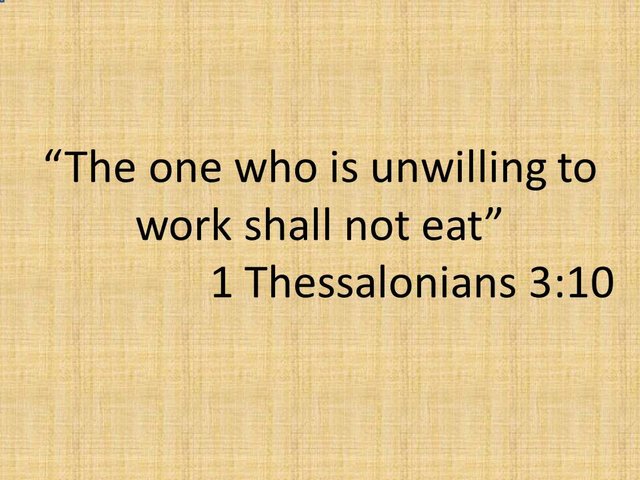The second epistle to the Thessalonians has 3 exhortations: the first to the perseverance, the second to the fidelity, and the third the duty to work.
When he teaches us about the duty to work, the apostle Paul gives a rule of wisdom: "The one who is unwilling to work shall not eat", 2 Thessalonians 3:10.
Although this rule is general, it is not applicable to every one, since in the first Christian communities there were elders and children, this rule refers to those who, being able to work, do not want to do it.
This rule is very important because the vice of sloth that is opposed to fortitude, is the source of most sins along with the love of money. The sloth is one of the seven cardinal sins: lust, gluttony, greed, sloth, wrath, envy, pride.
The basis of the Christian life is life in common (communion), and life in common requires everyone to fulfill their responsibilities, putting all assets in common implies that responsibilities are also common. The sloth is a very dangerous sin against the communion.

About life in common the apostles speak to us: "All the believers were one in heart and mind. No one claimed that any of their possessions was their own, but they shared everything they had" Acts 4:3
It is very important to understand that love for God and the neighbor implies a daily effort to improve the living conditions of life in society and that implies a concept: progressive work. Progressive work is one of the seven spiritual gifts of the holy spirit.
The life in common is common good with concord, the union of hearts and minds. The concord is also as Aristotle explains, "political friendship", that is to say the friendship of the people as members of the "polis" or "city". And this friendship of citizens as citizens implies that everyone must be clear about the objectives of the community: common needs such as health and education must be addressed promptly, there is no place for laziness in adult society.
For more information visit my profile, follow the link, and download for free my ebook.